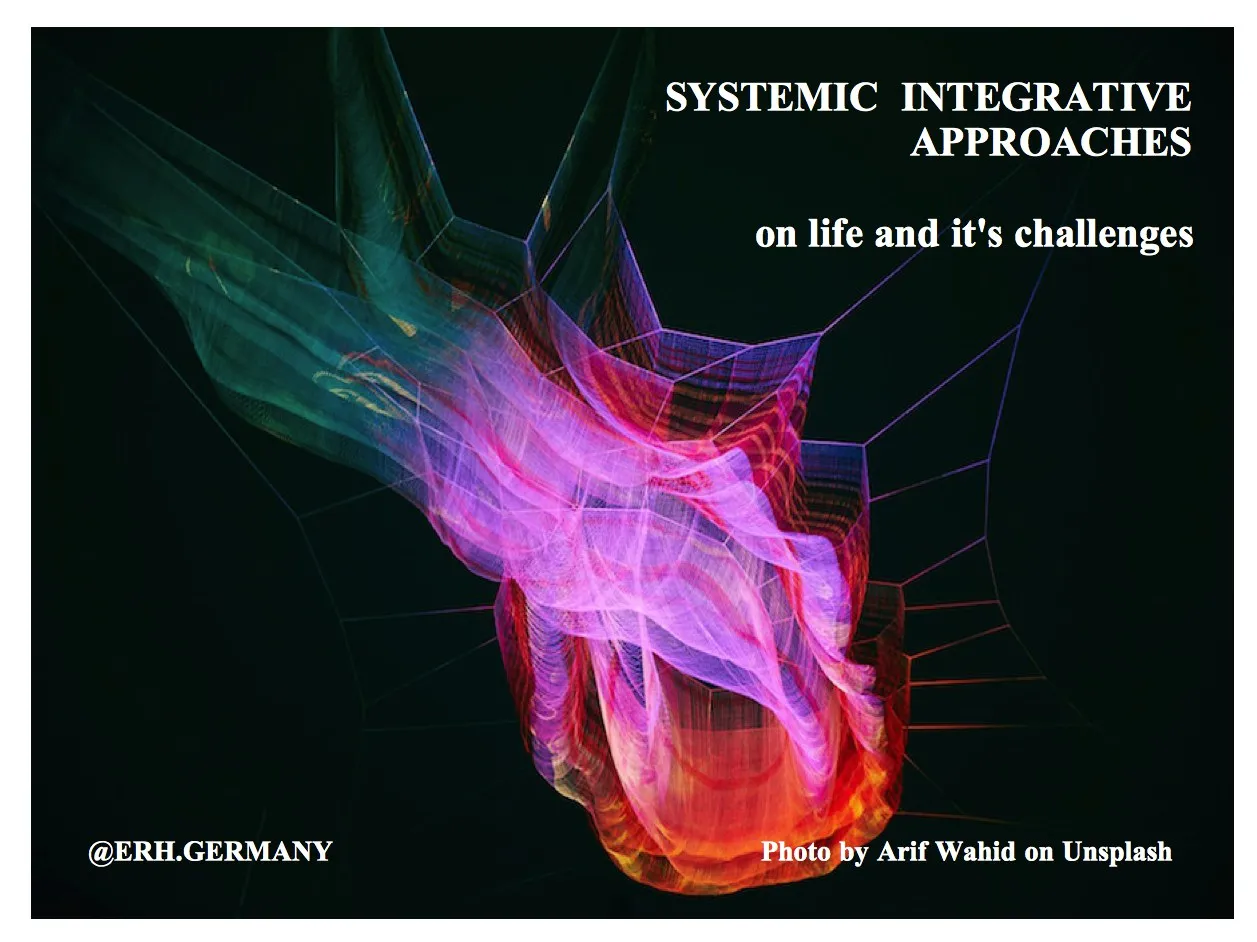
May I introduce: This is my very first post of ...
"Systemic integrative approaches on life and it's challenges"
I start with a three-part article, which shows the conflict- and solution potentials after a separation between parents, it further points out perspectives and the strengths of children. In part three I will publish about scenarios and practical exercises. Altogether I follow the goal to serve a helpful communication style between the separated parents.
I want to be useful not only to people I meet physically but also to all whom are interested in further development of themselves.
Todays Topic: Separation of couples with children - Learn to communicate & understand
Split or divorced parents who share the right of care and contact for their child are faced with the task of regularly talking to each other and making important decisions for their child together. The topic here is said to be that conflicts often occur, especially if the parents have very fundamental differences in their parenting style [1], upbringing habits and values.
Differences are beneficial - Dad can only make macaroni with cheese but assembles everything that has edges and ...
Mom is a loser at camping, but an excellent story reader.
The assumption is that the mutual recognition and appreciation of parental differences promote the childs development.
I would like to comment on the differences and their positive potentials. I use the principle of re-framing [2]. Here it is the issue "differences are bad". This is because, in the event of a conflict, the differences between people are generally perceived and treated mainly negatively. But what if I turn the frame to another angle and surprise them with the statement that actually "differences aren't only not bad but also could benefit the child"? In fact, this had a positive effect on my meetings with parents due to the irritation bonus.
It is contrary to the usual opinion of many parents, who claim that children are overwhelmed by their parents differences. Which, of course, is true. This is partly due to deficit-oriented thinking, which overlooks the fact that children not only have a single main focus of life, but also move around in nurseries, schools, sports and music clubs, which play a decisive role in shaping and influencing their lives. Grandparents are also identity-forming for their grandchildren and have an influence on their child's development and value system.
Rather, two different parental homes are a problem for parents (emotional and organizational), but not for children who are accustomed to the fact that they encounter changing caregivers, different rules and basic conditions. This is the life of today's children and the more normal their parents accept and act within this, the less stress they put on their offspring.

What is the conflict potential of separated parents?
It is expressed in the fact that the respective parent feels responsible for seeing his or her child grow up in accordance with his or her values and wants to have these values in many parts the same as those of the separated partner. In the life of the child, these are topics such as hygiene, nutrition, media behaviour, health, education, the parental rules in the domestic environment and interpersonal relations with the child.
In existential issues such as the child's health or school, parents are asked to listen to each other's point of view and concerns in order to make decisions. By law, they automatically share both their duties and rights. Their notions are not necessarily uniform, they should be argued and negotiated in the child's interest and have the result that the child does not come under the grind of the argument. In the event of long-lasting and great disagreement and persistence on one's own standpoint, mediation or educational counselling is the best option.
Do separated parents have to put themselves in line with each other?
No, only if they have expressly agreed to do so.
When a child grows up in two different homes, it learns by osmosis that there are different rules and manners. The tasks and rules of behaviour that are important for mum and dad are revealed to the child in everyday life. Also, that the child is required to do some things in its motherly environment that do not occur at all with the father - and vice versa - is part of the child's normal growing up. The differences can be very small, but there can also be large deviations in the parenting style and values, which lead to friction and emotionally exhausting arguments between the parents.
[note: underneath it is not the "differences" between the parents, it is "non acceptance" about the fact that differences even are there.]

Interference in the parenting: what does that mean?
Usually, parents interfere with the upbringing of the other parent when they are concerned about their child.
It is unwelcome buzz when it's combined with aroused expression.
In addition, there are aspects such as a lack of trust in the parental competence, as well as stress and strains in one's own lifestyle. Parental overload leads to a situation in which the other person is required to increase his or her area of responsibility or align his or her priorities with their own. This is based on the desire to share responsibility on an equal footing and not to feel left alone with the tasks. Which is a very understandable wish and if not denied helps getting along.
The following thoughts or accusations may be familiar:
- "My kid's sick, and the other parent just doesn't care enough."
- "My child has problems at school - we have to take that seriously!"
- "My child is behaving badly at home - he learns too little good manners from the other one."
- "My kid comes back dirty and unshowered - isn't hygiene a priority over there?"
- "I have a stressful everyday life - my child has to function and not just see its fun served!"
- "I'm always the bad guy - but it's important to teach the child its duties!"
Such statements are perceived by the other parent as attacking or interfering in the everyday life of the parent. Quite natural reactions to this are spontaneous resistance and the wish that the other should hold back with criticism and know-it-all. It is just as common that accusations are producing counterpropositions.
In fact, parents who wish to implement their contact on an equal footing should be aware that as mothers and fathers they are not entitled to an equal upbringing of the child. This may have been a main reason for separation, for example, or was an aspect of separation. No matter whether it is an alternating model (half of the right of access resp. 50/50 model) or a visiting model after the separation (a weekend every two weeks).
How important are a parent's values?
They are very important.
Every human being has undergone an imprint and socialisation which was first formed by the family of origin and later by school and other important stations. In the systemic approach this is called "Pillars of Identity" [3]. Depending on which values a person has adopted and represents for his or her life, he or she puts the appropriate emphasis on these values in the education of the child.
That's good and right.
Without convictions, habits and rituals, no parent would be able to provide the young with the necessary orientation. The fact that we often educate our offspring in a similar way to what we ourselves experienced as children may be very right for one and unpleasant for the other, but we always react to our children both automatically and consciously at the same time. This means that we combine our educational intentions with our values. We correct ourselves where we recognize our weaknesses and feel good, where we experience our strengths and light moments in dealing with our child.
Both parents have a right to communicate their values to the child. No value is therefore more important or unimportant.
Thank you for your attention!
The second part will focus on what happens when parents bring the child into a conflict of loyalty and how they can accept the "misconduct" of their child as a salutary signal.
Part 2 - "Dad's an idiot and Mom is a bitch"
Part 3 - From Horror to Humor Scenario
As a consultant I work with family systems and the related issues within a system - this includes singles and couples/separated couples & patchwork families. My other focus is personal coaching including all Pillars of human identity (extract of Helmut Kames' diploma thesis, unfortunately only in German).
Systemic counselling involves counselling people with regard to their respective social systems in the respective context. Among other things, it includes advice on the family context. Systemic consulting is based on system theory, e. g. Talcott Parsons, constructivism, e. g. Fritz B. Simon and second-order cybernetics, e. g. Heinz von Foerster, Cybernetics of Cybernetics, The Control of Control and the Communication of Communication [1]: Diana Baumrind’s (1966) Prototypical Descriptions of 3 Parenting Styles; Link extern Images: follow me: @erh.germany
[2]: “Seeing Things in a New Light” - Author: Antti Mattila / Helsinki University Link extern
[3]: Five pillars of Identity: Helmut Kames / Quote from the Website: "The article presents an „Inventory for the Measurement of the Five Pillars of Identity" (FESI). The inventory is assigned its place within process diagnostics proceeding on their conception by Integrative Therapy. The item identity is conceived within the context of an integrative theory of personality which centers on the elements seif, ego and identity. The author develops the concept of the Five Pillars of Identity. The items deduced from the theory of Integrative Therapy have been statistically analysed and compiled to the current final form of the 'FESI'".
Photo by Arif Wahid on Unsplash
Photo by Ross Findon on Unsplash
Photo by Verena Yunita Yapi on Unsplash
If this has met your taste and interest,
